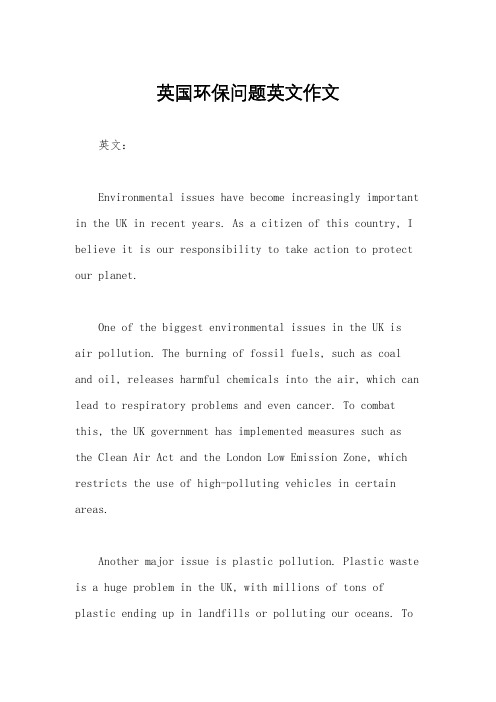英国环境保护政策的研究 论文The study of UK’s policy on environmental protection
英国的环境保护政策及措施

英国的环境保护政策及措施英国作为一个高度发达的工业化国家,在过去的发展历程中曾面临过严重的环境问题。
然而,经过多年的努力和探索,英国已经制定并实施了一系列全面且有效的环境保护政策及措施,在环境保护方面取得了显著的成就。
在空气污染治理方面,英国采取了严格的措施。
过去,工业排放和交通尾气曾使英国的空气质量严重恶化。
为了改善这一状况,英国政府制定了严格的空气质量标准,并对工业企业的废气排放进行严格监管。
要求工厂安装先进的废气处理设备,以减少有害气体的排放。
同时,大力推广清洁能源的使用,鼓励企业采用太阳能、风能等可再生能源,逐步减少对传统化石能源的依赖。
在交通领域,推行了更严格的汽车尾气排放标准,鼓励民众购买电动汽车和混合动力汽车,并加大对公共交通的投入和改善,以减少私人汽车的使用量,从而降低交通尾气的排放。
在水污染治理方面,英国也下了很大的功夫。
工业废水和生活污水的排放曾经对河流、湖泊和海洋造成了严重的污染。
为了解决这个问题,英国政府加强了对污水排放的监管,要求企业和污水处理厂必须达到严格的排放标准。
同时,投入大量资金用于建设和升级污水处理设施,提高污水处理的效率和质量。
此外,还开展了大规模的河流和湖泊生态修复工程,通过种植水生植物、改善水生态系统等方式,提高水体的自净能力。
对于固体废物的处理,英国实施了分类回收和循环利用的政策。
在社区和公共场所设置了分类垃圾桶,对可回收物、有害垃圾和其他垃圾进行分类收集。
同时,建立了完善的垃圾回收体系,对可回收物进行加工处理,重新制成新产品,以减少对自然资源的消耗。
为了减少垃圾的产生,还推行了“零废弃”理念,鼓励消费者选择环保包装的产品,减少一次性用品的使用。
在土地保护方面,英国注重生态农业的发展。
通过推广有机农业和可持续农业技术,减少化学农药和化肥的使用,保护土壤的肥力和生态平衡。
同时,加强对土地开发的规划和管理,限制过度开发和滥用土地资源,保护自然栖息地和生物多样性。
英国关于环境的政策

英国关于环境的政策英国关于环境的政策英国是世界上最早开始实施环保政策的国家之一,自20世纪初就开始执行环境保护法律。
近年来,随着环境问题日益突出,英国政府加大了对环境保护的投入,提出了一系列措施和政策,致力于减少污染、改善环境质量、推进可持续发展。
减少污染英国政府认为减少污染是保护环境、保障人类健康的重要实践。
为此,英国采取了一系列措施,例如限制污染物排放、调整交通方式、推广清洁能源等。
其中,在能源领域,英国政府提出了“脱碳”目标,致力于在2050年前实现全国碳中和。
为实现这一目标,英国政府采取多种措施,例如推广电动汽车和太阳能等清洁能源、加大对碳减排技术的投资等。
改善环境质量英国政府还致力于改善环境质量,为人民提供更加宜居的环境。
在饮用水、空气质量、噪声污染等方面,英国政府作出了长期的努力。
在2000年以来,英国空气质量明显改善,主要是由于减少了柴油机排放、提高了工厂的污染控制等。
此外,英国政府还大力推广公共交通和自行车等交通工具,减少了汽车尾气和交通噪声对城市居民的影响。
推进可持续发展英国政府在环保领域的综合目标是推进可持续发展。
为此,英国政府推动了多项政策,包括减少碳排放、推广可持续能源、改善循环经济体系等。
英国政府还认为,在推进可持续发展的过程中,需要兼顾经济、社会和环境的利益,确保可持续性的平衡。
除此之外,英国政府还注重通过立法和规制,保护自然资源和生态系统。
其中,野生动物及其栖息地保护法、土地改良法以及海洋保护法等是英国环境保护法律的代表。
这些法律和规范为环保工作提供了清晰的法律依据和操作指南,为英国保护生态系统和促进可持续发展提供了充分的保障。
结语总的来说,英国政府在环保领域的长期投入和努力取得了显著成效。
英国环境政策的多元化体系和法律制度建设为生态文明的发展提供了有益的经验。
期待未来,英国环保政策将会继续追求创新和卓越,为建设更加美好的未来贡献力量。
英国农业环境保护政策

英国农业环境保护政策第一篇:英国农业环境保护政策英国农业环境保护政策措施及其启示近年来通过大力推广循环农业、保了粮食产量增长,还保护了农业生态环境,促进农业产业可持续发展。
但由于公众农业环保意识仍比较薄弱,环境保护基础设施欠缺等问题依然存在,我国农业环境保护仍面临着诸多问题。
更有甚者,在某些地区农业面源污染威胁到食品安全,对我国粮食安全产生了不良影响。
英国作为先进农业国家,虽然其国情与我国不尽相同,但其在农业环境保护领域的政策与措施有着先进性、代表性。
通过借鉴英国农业环境保护经验,对我国保护农业生态环境、保障食品安全、提高农产品国际竞争力、适应全球农产品贸易要求有重大意义。
英国农业现状英国位于欧洲西部,由大不列颠岛(包括英格兰、苏格兰、威尔士)、爱尔兰岛东北部和一些小岛组成,与欧洲大陆隔海相望。
属海洋性温带阔叶林气候,通常最高气温不超过32℃,最低气温不低于-10。
英国农用土地占国土面积的77%,其中多数为草场和牧场,仅1/4用于耕种。
农业人口人均拥有70 hm 土地,是欧盟平均水平的4倍。
农业占国内生产总值的比重不到1%,从业人数约45万,不到总就业人数的2%,低于欧盟国家5%的平均水平,也低于其他主要工业国家,但由于其生产率高,粮食自给率达到60%,每年每个农业劳动力生产约40 t谷物、7 t肉制品、30t牛奶和1 t鸡蛋。
英国农业环境保护的历史背景如同其他发达国家,英国现行农业环境保护政策并非一蹴而就,农业环境问题曾经十分突出,20世纪80年代之前,为了应对第二次世界大战后人口增长以及经济恢复的需求,英国农业发展的目标只有增加产量。
期间,英国农民为了增产盲目地滥用化肥和农药,造成了一系列环境问题,导致了水体和土壤的污染。
据统计,农业造成了英格兰水体中1/4的磷、接近1/2的病原菌和3/4的沉积物污染,同时杀虫剂、除草剂等化学制剂也随着径流水进入水体,对河流湖泊造成了污染。
与此同时,随着科技的发展农业生产效率不断提高,而欧洲国家人口长时期保持零增长甚至负增长,欧洲国家普遍出现农业生产过剩,增加的粮食供应不仅不能带来收益反而加重了资源环境的负担,随着农业生态环境问题越来越受到社会关注,在政府和社会各界的努力下制订了一系列有利于保护农业生态环境的法律法规和政策,为配合欧盟新的共同农业政策,英国也开始调整农业政策,不再以增加粮食产量作为农业发展的唯一标准。
英国环保政策

英国环保政策旨在减少温室气体排放、促进可持续发展、保 护自然环境和生物多样性,同时提高资源利用效率,实现经 济、社会和环境的平衡发展。
英国环保的重要性
国际责任
英国作为全球气候变化和环境保护的重要参与者,需要承担国际责任,积极 推动全球环保事业的发展。
国内需求
英国的环保政策也符合国内民众和产业界的需求,有利于改善空气质量、提 高能源效率、减少废物排放等,促进经济和社会的可持续发展。
面临的挑战
减排压力
随着全球气候变化问题日益严峻,英国面临国际压力,需要进 一步降低温室气体排放。
资源利用问题
英国经济发展面临资源短缺问题,需要提高资源利用效率,促进 循环经济发展。
环保意识差异
部分英国民众对环保政策缺乏了解和认同,环保意识有待提高。
未来的发展目标与趋势
发展清洁能源
英国计划大力发展核能、风能等清洁能源,以减少对化石燃料 的依赖。
贸易壁垒
环保政策可能对出口型企业形成一定的贸易壁垒,导致产品在 市场上竞争力下降。
对社会的影响
提高生活质量
环保政策的实施有利于改善空气质量、提高水资源品质 ,为公众提供更安全、舒适的生活环境。
健康风险
严格的环保政策可能增加企业的环保成本,导致产品价 格上涨,可能给消费者带来负担。
社会不公
环保政策的执行可能加剧社会不公,对部分弱势群体造 成不利影响,如贫困地区的居民和企业。
02
英国环保的主要内容
减少碳排放
碳排放减少战略
英国政府已制定目标,到2050年将碳排放减少至1990年的50%。
碳捕获和储存
英国正在积极研究碳捕获和储存技术,以减少大气中的二氧化碳浓度。
提高能源效率
英国环保问题英文作文

英国环保问题英文作文英文:Environmental issues have become increasingly important in the UK in recent years. As a citizen of this country, I believe it is our responsibility to take action to protect our planet.One of the biggest environmental issues in the UK isair pollution. The burning of fossil fuels, such as coal and oil, releases harmful chemicals into the air, which can lead to respiratory problems and even cancer. To combat this, the UK government has implemented measures such as the Clean Air Act and the London Low Emission Zone, which restricts the use of high-polluting vehicles in certain areas.Another major issue is plastic pollution. Plastic waste is a huge problem in the UK, with millions of tons of plastic ending up in landfills or polluting our oceans. Toaddress this, many supermarkets and businesses have started to reduce their use of plastic packaging, and the government has introduced a plastic bag tax to encourage people to use reusable bags.In addition to these issues, climate change is also a major concern. The UK has committed to reducing its greenhouse gas emissions by 80% by 2050, and has taken steps such as investing in renewable energy and promoting energy efficiency in homes and businesses.Overall, I believe that it is important for individuals and governments to take action to address environmental issues in the UK. By making small changes in our daily lives, such as using public transport instead of driving and recycling, we can all contribute to a healthier planet.中文:近年来,环保问题在英国变得越来越重要。
英国的环境保护政策及措施

英国的环境保护政策及措施英国,作为一个工业化进程较早的国家,在享受现代化带来的便利的也意识到了环境保护的重要性。
为了应对工业化带来的环境问题,英国制定了一系列的环保政策和措施。
一、英国环境保护政策1、空气污染控制英国采取了严格的空气污染控制政策,以减少大气污染物排放。
例如,英国实施了《清洁空气法案》,对工业和家庭燃料的排放设定了严格的限制。
英国还引入了绿色证书制度,鼓励使用可再生能源和低排放技术。
2、水资源保护英国制定了《水资源法案》来保护水资源。
该法案规定了水资源的开采和使用必须经过许可,并要求对水体进行定期检测和维护。
英国还鼓励雨水收集和再利用,以减少对自然水资源的压力。
3、废物管理英国通过《废物管理法案》来管理废物。
该法案规定了废物的分类、回收和处置。
英国还鼓励企业和个人进行废物分类和回收,以减少废物的产生和对环境的污染。
4、自然生态保护英国通过设立自然保护区和实施生态保护政策来保护自然生态。
例如,英国设立了多个国家公园和自然保护区,以保护野生动植物和生态系统的完整性。
英国还实施了野生动物保护计划,保护濒危物种。
二、英国环境保护措施1、能源转型为了减少碳排放和应对气候变化,英国正在加快能源转型。
英国政府提出了“绿色新政”,旨在到2050年实现碳中和。
这一政策包括大力发展可再生能源、推广电动汽车、提高能源效率等措施。
2、工业减排英国对工业排放设定了严格的限制,并鼓励企业采用清洁生产技术和低排放工艺。
对于超过排放限制的企业,英国会采取罚款等措施来确保其遵守环保法规。
3、绿色城市规划英国的城市规划注重绿色理念,强调城市绿化、雨水管理和公共空间的设计。
例如,伦敦的“花园城市”项目旨在通过增加城市绿化和提高公共空间质量来改善居民的生活环境和减少碳排放。
4、环保教育英国注重环保教育,通过学校课程和公共宣传活动提高公众的环保意识和技能。
例如,英国的学校课程中包含环境科学和可持续发展的内容,以培养学生对环境保护的认知和责任感。
英国生态环境保护政策与启示

汇报人: 日期:
目录
• 引言 • 英国生态环境保护政策体系 • 英国生态环境保护政策实施与
监管 • 英国生态环境保护政策对我国
的启示
目录
• 我国生态环境保护政策现状及 挑战
• 结论与展望
01
引言
背景与目的
生态环境保护的重要性
随着全球环境问题日益严重,生态环境保护已成为各国政府和社会关注的焦点 。
培养绿色生活方式
英国倡导绿色生活方式,鼓励公众积极参与环保行动。我国应引导公众树立绿色消费观念,减少资源消耗和环境污染 ,培养可持续的生活方式。
发挥民间组织作用
英国民间组织在环保工作中发挥了重要作用。我国应鼓励和支持民间组织参与环保工作,发挥其灵活性 和社会资源优势,形成政府与民间组织共同推动的良好局面。
生态补偿机制
英国政府建立了生态补偿机制,通过资金投入和政策引导,鼓励企 业和公众参与生物多样性保护工作。
生物多样性保护法规
英国的生物多样性保护法规对破坏和污染自然环境的行为进行严格 监管,违规者将面临法律责任和罚款。
03
英国生态环境保护政策实施与 监管
政策实施机构与职责
01
02
03
政府机构
英国政府设立了多个负责 生态环境保护的机构,如 环境、食品和乡村事务部 ,以及地方环境部门。
05
我国生态环境保护政策现状及 挑战
我国生态环境保护政策现状分析
1 2 3
政策体系
我国已经建立了一套完整的生态等。
监管体系
我国拥有较为完善的生态环境监管体系,包括国 家、省、市、县四级环境监测网络和环境应急处 置体系。
治理措施
我国采取了一系列有效的治理措施,如实施重点 流域水污染防治、大气污染防治行动计划等。
英国生态环境保护政策与启示

英国生态环境保护政策与启示在全球生态环境保护的大背景下,英国作为一个发达国家,在生态环境保护方面积累了丰富的经验,并形成了一系列行之有效的政策。
深入研究英国的生态环境保护政策,对于我国加强生态环境保护、推动可持续发展具有重要的启示意义。
英国的生态环境保护政策涵盖了多个领域,包括大气污染治理、水污染防治、土壤保护、废弃物管理以及生物多样性保护等。
在大气污染治理方面,英国曾经历过严重的雾霾事件,这促使其采取了一系列强硬措施。
通过制定严格的空气质量标准,加强对工业排放、交通运输等领域的监管,大力推广清洁能源,如风能、太阳能等,英国的空气质量得到了显著改善。
同时,对老旧车辆进行淘汰和更新,鼓励公共交通和绿色出行方式,减少机动车尾气排放。
水污染防治是英国生态环境保护的另一个重要方面。
英国建立了完善的水质量管理体系,对河流、湖泊、地下水等进行全面监测和评估。
加强污水处理设施的建设和运营管理,提高污水处理标准,严格限制工业废水和农业面源污染的排放。
此外,通过实施流域综合管理,协调上下游之间的水资源利用和保护,保障了水资源的可持续利用。
土壤保护方面,英国注重土壤质量的监测和评估,制定了土壤保护法规和政策。
采取措施防止土壤侵蚀、土地退化和土壤污染,鼓励合理的农业耕作方式和土地利用规划,以保持土壤的肥力和生态功能。
在废弃物管理领域,英国推行了垃圾分类和回收利用制度。
通过宣传教育,提高公众的环保意识,促使居民积极参与垃圾分类。
同时,建立了完善的废弃物回收处理体系,加强对废弃物处理企业的监管,提高废弃物的资源利用率,减少填埋和焚烧带来的环境污染。
生物多样性保护也是英国生态环境保护政策的重要组成部分。
划定了大量的自然保护区和野生动植物栖息地,加强对珍稀物种的保护和繁育。
采取措施控制外来物种入侵,保护生态系统的平衡和稳定。
英国生态环境保护政策的成功实施,得益于其完善的法律法规体系、严格的监管机制、充足的资金投入以及公众的广泛参与。
- 1、下载文档前请自行甄别文档内容的完整性,平台不提供额外的编辑、内容补充、找答案等附加服务。
- 2、"仅部分预览"的文档,不可在线预览部分如存在完整性等问题,可反馈申请退款(可完整预览的文档不适用该条件!)。
- 3、如文档侵犯您的权益,请联系客服反馈,我们会尽快为您处理(人工客服工作时间:9:00-18:30)。
海南师范大学外国语学院2011级《英语国家概况》课程论文英国环境保护政策的研究The study of UK‟s policy on environmental protection姓名:学号:专业:年级:系别:完成日期:指导教师:The study of UK’s policy on environmental protectionAuthor: Yu Ruixue Yang Shuping Supervisor: Xue Haiyan (Foreign Language college, Hainan Normal University, Haikou 571158)Abstract:This paper introduces the main polluted areas and solutions of UK on environment pollution, which includes the air pollution, the water pollution, land pollution, the deforestation, and the industrial and household waste as well as their solutions. It aims at clarifying the reasons and urgency of solutions UK took on environmental protection and figure out the helpful lessons in modern society considering the situation and development of China. The research may help both the environmental e ducators or learners who want to do a research on UK‟s policy on environmental protection and common people who wants to learn something about environmental protection.Key words:UK,industrial revolution, environmental protection, effective英国环境保护的研究作者:余睿雪杨淑平指导教师:薛海燕(海南师范大学外国语学院,海口,571158)摘要:本文介绍了英国环境污染主要地区和保护环境的解决方针,其中包括大气污染、水污染、土地污染、森林破坏以及工业和生活浪费以及各个对应的解决方针。
本文主旨是阐明英国实施环境保护政策的适时性,中国对此学到的经验、教训。
本次研究可能受益的有:想要从事英国环境保护政策研究的教育者、学习者以及想要对英国环境保护有所了解的人。
关键词:英国;工业革命;环境保护;有效Contents:1. Introduction (4)1.1Background information (4)1.2Warning bell (4)2. Environmental protection (5)2.1Air Pollution (5)2.2Land pollution (5)2.3Water pollution (7)2.4Deforestation (7)2.5Industrial and Household waste.............................................. (7)3. The analysis of the solutions on environment protection (8)3.1 The achievements of the solutions (8)3.2 The environment protection expenditure................................... (8)4. Conclusion (9)4.1 Go to the future (9)4.2 The lessons of UK‟s environmental protection for China (10)Bibliography (10)Introduction:As we all know, Britain as a successful example of industrial revolution, he brings the world too much surprise. But at the same time, he also paid a big price for what he did. With the rapid increase of economy, people just knew profit and they ignore the environmental idea. People from all classes grab various resources from the nature and emit all kinds of contaminates. Neither living condition nor running conditions were desperate. Fortunately, the government and some people realized these terrible problems and tried their best to improve the lost consciousness of environment. So Britain has taken a serious of environmental protection action then. And we will see how UK effectively keeps away from endless cloudy.1.1.Background informationIn 1765, the appearance of the Jenny spinning machine officially opened the prelude of “mechanical age”. In the middle of 19th century, Britain has become the highest industrialized country all over the world, and has been regarded as “the factory of the world”. But on the way to society and urbanization, with the development of modern society, a series of environmental problems followed. The use of factories and mass production has led to a depletion of certain natural resources, leaving the environment permanently damaged1.2. Warning bellApparently, UK took the policy of “pollution first, treatment later”, which despoils their bright sunshine and blue sky. In the late 19th century, the increasing problems of environmental pollution and diseases shocked the whole nation. (It also caused environmental damage - for example, waste sent to landfill produces methane, a powerful greenhouse gas. They wanted to move towards a …zero waste economy‟. This doesn‟t mean that no waste exists - it‟s a society where resources are fully valued, financially and environmentally. It means they reduce, reuse and recycle all we can, and throw things away only as a last resort.)In that case, the British parliament carried out a large amount of environmental survey. After mastering and understanding a lotsof materials and data basis, they passed some constitution and tried to find out solutions by legislation.Environmental protections:2.1. Air PollutionBack in the Middle Ages the use of coal in cities such as London, air Pollution was beginning to escalate. The problems of poor urban air quality even as early as the end of the 16th century are well documented. In the UK the Industrial Revolution during the 18th and 19th centuries was based on the use of coal. Industries were often located in towns and cities, and together with the burning of coal in homes for domestic heat, urban air pollution levels often reached very high levels. During foggy conditions, pollution levels escalated and urban smogs (smoke and fog) were formed. These often brought cities to a halt, disrupting traffic but more dangerously causing death rates to dramatically rise. The effects of this pollution on buildings and vegetation also became obvious.British parliamentary has spent lots of time on it. In 1863, the parliamentary has passed the Alkali Works Act which required the alkali industry to suppress 95% emissions in order to control the poisoned gas produced by alkali manufactory technology. The second Alkali Works Act was issued in 1874 which required the factories to take effective measures to control the poisoned and harm gas, and classified the industries in 1907. The 1875 Public Health Act contained a smoke abatement section to try and reduce smoke pollution in urban areas. British parliamentary had passed overall and systematic Gas Cleaning Act because of the big impact of London gas event in 1952. In 1995, the Government passed its Environment Act, requiring the publication of a “National Air Quality Strategy”to set “standards” for the regulation of the most common air pollutants.2.2. Land pollutionDuring extraction and mining activities, many land space are created beneath the surface, so the land caving in is often heard. Besides, due to increase in demand forfood, shelter and house, more goods are produced. This resulted in creation of more waste that needs to be disposed of. Research and development paved the way for modern fertilizers and chemicals that were highly toxic and led to soil contaminations and so on, all these things just led to the severe land pollution.So the UK Department of Environment, Food, and Rural Affairs (DEFRA) is developed the First Soil Action Plan for England in 2004 and establishes policy for the clean up of contaminated land. Primary responsibility for the management of contaminated lands lies with local authorities, and voluntary solutions to contamination problems are sought when possible. The Environmental Protection Act 1990 establishes who should pay for remediation and requires that local authorities identify contaminated land. The UK's 2006 Contaminated Land Regulations include rules for public registers of contaminated properties and for remediation notices. DEFRA manages the Contaminated Land Capital Projects Programme to assist local authorities in investigating and remediating contaminated land. The UK Department for Communities and Local Government oversees land contamination issues in planning under Planning Policy Statement 23 and the Office of the Prime Minister is responsible for policy on Brownfield in the UK. A number of quasi-governmental and non-governmental organizations in the UK support work to remediate contaminated properties and address economic development challenges associated with Brownfield. There are many organizations to protect the contaminated land, such as: Contaminated Land: Applications in Real Environments (CLAIRE), which is an independent, not-for-profit organization established to stimulate the regeneration of contaminated land in the UK. The British Land Reclamation Society is an interdisciplinary nonprofit organization concerned with the reclamation, regeneration, and restoration of land. The British Urban Regeneratation Association identifies and promotes best practice in regeneration, and the Contaminated Land Assessment & Remediation Research Centre develops technology for sustainable, cost-effective assessment and remediation of contaminated environments.2.3. Water pollutionWater pollution is a chemical or biological substance that builds up in the environment enough to be toxic, harmful or a nuisance to humans, other animals, or other living things. The pollution could be a combination of sewage, oil, acid rain, highway runoff, and all kinds of other things.From 1874 to 1855, British parliamentary has passed The Channel Law. Public Health Law, Capital Management Action. Eliminate The Pollution Harm Act, The Regulation Of River Pollution Protection And Treatment. Public Health Regulation in order to solve problem of water pollution and urban water use. So far, British has basically established the integrated legal system water pollution prevention.2.4. DeforestationDuring the industrial revolution, the population of UK increased rapidly. Therefore, the demand for food, shelter and cloth has almost tripled in the 18 century. To overcome growing demand, a direct and convenient action that we have come to recognize as “deforestation” occurs.In order to protect the forests, the government has done much. In January 2013, the government published the …Forestry and woodlands policy statement‟. This sets out how they will protect, improve and expand the public and private woodlands.In July 2013 the government published an implementation plan which details the progress they have made against the 36 commitments in the policy statement.To make sure that the policies are properly managed and protected, the government also set up a new, independent public body, which will hold the Public Forest Estate in trust for the nation and provide funding for the management of these forests, including £3.5 million that they‟ve included in the ForestryCommission budget for 2013 to 14 and up to £2 million to implement the plans in the forestry and woodlands policy statement.2.5. Industrial and Household waste.With the development of industry and the demand for food, shelter and house, more good are produced.The UK generates about 177 million tones of waste every year in England alone. This is a poor use of resources and costs businesses andhouseholds‟ money. It also causes environmental damage - for example, waste sent to landfill produces methane, a powerful greenhouse gas. So the UK government t took actions to help people and organizations make the most of opportunities to save money by reducing waste.The government developed the waste prevention programme for England. The programme sets out to help businesses understand and take advantage of the savings they can make by using resources efficiently and preventing waste; make it easier for people to find out how to reduce their waste, and how to reuse items they no longer want; help organizations and people to make the most of opportunities to save money by reducing waste; carry out the plans we set out in the regulation and enforcement section of the review of waste policy; carry out research to develop a better evidence base to inform approaches to regulation and policy.The analysis of the solutions on environment protection:3.1. The achievements of the solutions:From above all, we can know that the UK has followed numerous forthright policies in tackling the long-standing environment issues, which make a great progress in environment protection. In the 19th century, UK‟s carbon emission ranks the first around the whole world, however in 2004, the UK was the world‟s 8th greatest producer of a man-made carbon emission, producing around 2.3% of the total generated from fossil fuel. According to UK‟s Low Carbon Transition Plan, by 2020, more than 1.2 million people will be in green jobs; 7million homes will have benefited from whole house makeovers, and more than 1.5 million households will be supported to produce their own clean energy; around 40 percent of electricity will be from low-carbon sources, from renewable energy resources, nuclear and clean coal. The average new car will emit 40 percent less carbon than now.Besides, UK has helped to launch the Climate Change Financing to assist the developing countries with $100 billion a year of public and private finaces.3.2. The environment protection expenditure.Environmental protection expenditure is defined as spending incurred by the company where the primary aim is to reduce environmental pollution caused during normal operations. It includes expenditure: to reduce or prevent emissions to air or water, to dispose of waste materials, to protect soil and groundwater, to prevent noise and vibration or to protect the natural environment. This definition has been agreed by all EU countries so we can produce information on the same basis.Environmental spending does not include spending on health and safety or any pending where the primary purpose is other than environmental protection. It includes: The purchase price of capital goods (to be recorded in the year in which they are introduced), both "end of pipe" and "integrated" capital investments (see diagram which illustrates these types of spending); Operational (running) costs of the company's own environmental management/ control activities; Payments to others for environmental protection services, for example for waste disposal, charges made by Water Service Companies for sewage treatment and general sewage charges.Conclusion:4.1.Go to the futureNowadays, the UK always commits to help their countries away from the haze one hundred years ago. The UK government was followed a forthright policy in tackling climate change since the Kyoto Protocol was signed in 1997. Under the agreement the government has agreed that the UK will meet tough targets to reduces carbon emissions incrementally between now and 2020.In November 2000, the UK Climate Change Programme was lunched by the British government in response to its commitment agreed at 1992 United Nation Conference on Environment and Development ( UNCED ). As the UK was still the world‟s 8th greatest producer of man made carbon commissions. The program aimedat cutting its green house emission.In November 2008, the Climate Change Act became Law. The act puts in place a framework to achieve a mandatory 80% cut in the UK‟s carbon emission by 2050.And two years followed, many kinds of commitment has been held that made some big strategies in order to realize the least green house gas emission, at the sametime, the most energy people get.4.2. Lessons for China:Not accidentally, in 1952 the UK's stage of economic development, its GDP per capita, was approximately the same as China's today. Looking at the lessons of London's pollution catastrophe, and how subsequently the situation in both the city and the UK was improved, may contain some lessons of use for China. Everyone wants to a cleaner environment to live, but, how should China do to provide us such a environment? Through our careful survey and conclusion, our suggestions are as following.Firstly, China is required to attaches high attention on environmental protection and get ready for a long struggle with more energy and expense. We may make great pollution in a day, but we can not solve the polluted problems within a day, which means that China has a long road to solve the pollution problems. Secondly, in the process of economy building, we are required to take care of environmental protection in case of falling into a wrong road that “pollution first, treatment last”. It means the government should take actions on economy and environment at the same time. Thirdly, as common people, we are suggested to learn more tips about environmental protection and do it right now no matter the effect of what we did big or nor. Such as saving every pieces of paper, trying to recycle what can be recycled and so on. With the help of government and all people around our country, we would lead a balanced development both ecological and environmental.Bibliography[1] Cause of land pollution. [DB/OL] /。
